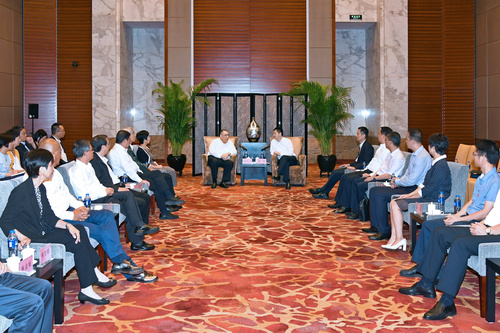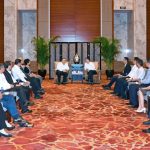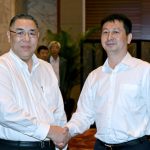 Chief Executive, Mr Chui Sai On, meets with the Mayor of Huizhou, Mr Liu Ji, during his visit to Huizhou.
Chief Executive, Mr Chui Sai On, meets with the Mayor of Huizhou, Mr Liu Ji, during his visit to Huizhou.
The Chief Executive, Mr Chui Sai On, continued yesterday (10 July) his tour of cities in the Guangdong-Hong Kong-Macao Greater Bay Area (Greater Bay Area), this time heading to Huizhou, where he met with the Deputy Secretary of the Communist Party of China Huizhou Municipal Committee and Mayor of Huizhou, Mr Liu Ji. Both sides said they looked forward to exploring and enhancing cooperation following the direction set by the Outline Plan for the Development of the Guangdong-Hong Kong-Macao Greater Bay Area.
During the meeting, Mr Chui said that since the signing of the Framework Agreement on Deepening Guangdong-Hong Kong-Macao Cooperation in the Development of the Greater Bay Area, witnessed by President Xi Jinping on 1 July 2017, Huizhou and Macao had actively participated in planning the advance of such initiative, and had been fully engaged in communicating and exchanging views. Mr Chui also expressed his gratitude to the Central People’s Government for allowing Macao to participate in the development of the Greater Bay Area.
He said there were two key aims in visiting Huizhou: to listen to advice and learn from the successful experiences of Huizhou; and for the two sides to explore and enhance cooperation following the direction set by the Outline Plan for the Development of the Guangdong-Hong Kong-Macao Greater Bay Area. Mr Chui said he hoped that cooperation projects could be implemented following the launch of the development plan.
The Mayor of Huizhou, Mr Liu, said that the eastern part of the Greater Bay Area, comprising Guangzhou, Dongguan, Shenzhen and Huizhou, had, overall, the highest level of economic development relative to other mainland settlements within the Greater Bay Area. Development in Huizhou had been somewhat less intensive than the other cities on that list, but Huizhou had a greater amount of land available for expansion, so had excellent potential for development, he added.
Huizhou had established two globally-competitive industrial clusters: one for the petrochemical industry at Daya Bay; and one for the electronics and information technology industry, known as the Huizhou Zhongkai Hi-tech Industrial Development Zone. It was hoped that, based on these two industries, an even stronger industrial sector could be developed. The Huizhou Municipal People’s Government was now planning to establish various platforms to support the development of these two industries.
During the meeting, a member of Macao’s Executive Council also in the visiting delegation, Mr Ma Iao Lai, said that the Macao Special Administrative Region (SAR) Government strongly supported the implementation of the Greater Bay Area development plan. Through the visit, the delegation would gain a better understanding and deeper knowledge of Huizhou. As the Macao Chamber of Commerce had established good networking practices with many cross-boundary and overseas counterparts, it was willing to tender its support and make use of Macao’s strengths and unique advantages for the promotion of cooperation in commerce, he added.
Vice Mayor of Huizhou, Mr Yu Jinfu, said that the planning of the Greater Bay Area had facilitated cooperation between Huizhou and Macao. To date, the two cities had established a solid foundation in exchanges regarding culture and sport. He looked forward to enhancing cooperation in many other areas in future.
Mr Yu said additionally that Macao had an outstanding performance in convention and exhibition business, and in tourism and hotel management, especially considering the rapid development of those service industries. As tourism was also a developing industry in Huizhou, Mr Yu hoped that Huizhou could enhance cooperation with Macao in tourism, hotel management know-how, talent cultivation and tour planning.
Mr Chui replied that Macao would actively adhere to the Outline Plan for the Development of the Guangdong-Hong Kong-Macao Greater Bay Area. Macao and Huizhou had already established high-quality cooperation in many areas, and the places could look forward to broadening and strengthening cooperation in other areas. As for tourism, the two cities might jointly promote development of multiple-destination itineraries, especially tours that link the nine cities of the Greater Bay Area.
The Chief Executive added that, with the active interest of – and support from – the Central People’s Government, Macao had engaged in extensive preparatory work and research in developing Traditional Chinese Medicine in the past decade, and had invested considerable resources in terms of finance and manpower. Macao had set up two state key laboratories for quality research in Traditional Chinese Medicine at two universities and at the Traditional Chinese Medicine Science and Technology Industrial Park in Hengqin.
Mr Chui emphasised that Macao attached importance to making use of its advantages in technology and its role as a platform, and had intensified its cultivation and promotion of the Traditional Chinese Medicine industry. Macao was willing to cooperate in order jointly to introduce Traditional Chinese Medicine and its products to the global market, he stated.
Mr Chui also said the Macao SAR Government considered the talent of Macao’s young people as a tremendous asset. Youth representatives from Macao had also been invited to join the visit to Huizhou, to provide young people with a greater number of opportunities to learn about and to observe relevant topics, in order to gain a better understanding of the development of the Greater Bay Area. He urged young people to equip themselves to achieve their career goals, and said he hoped they would perfectly integrate their efforts into the economic sectors of the future.
Other attendees at Tuesday’s gathering included: the Secretary for Administration and Justice, Ms Chan Hoi Fan; Executive Council spokesperson Mr Leong Heng Teng; and Executive Council members Mr Liu Chak Wan, Mr Cheang Chi Keong, Mr Chan Meng Kam, Ms Ho Sut Heng and Mr Lam Kam Seng; the Chief-of-Office of the Chief Executive's Office, Ms O Lam; the Director of the Government Information Bureau, Mr Chan Chi Ping; the Director of the Protocol, Public Relations and External Affairs Office, Ms Lei Ut Mui; the Principal Advisor of the Policy Research Office, Mr Mi Jian; 13 members of the “Thousand Talents Union”; the Secretary-General of the Huizhou Municipal People’s Government, Mr Wu Xianmin; and the Director of the Hong Kong and Macao Affairs Office of the People’s Government of Guangdong Province, Mr LiaoJingshan.
Prior to the meeting, Mr Chui, the Macao SAR Government delegation and the representatives of the “Thousand Talents Union” were accompanied by Mayor Liu and Vice Mayor Yu on a visit to the Huizhou Huamao Centre. The visitors received a briefing on the real estate project by the Chief Planner of the Bureau of Housing, Urban and Rural Planning and Construction of Huizhou Municipality, Mr Cao Chaofeng, and posed for a group photo in front of the development.
Mr Cao explained that Huizhou had attracted investments from more than 50 countries and regions, including Hong Kong, Macao and Taiwan. As a gateway for the Greater Bay Area to develop eastward, Huizhou would seize the opportunities of the “Belt and Road” initiative in order to explore horizons for regional collaboration and urban and rural integration.
During the visit, the Chief Executive and the delegation also attended briefings on the Sino-Korea (Huizhou) Industrial Park, Huizhou’s Tonghu Ecological and Smart Zone, and the new districts aroundDaya Bay.
View gallery


